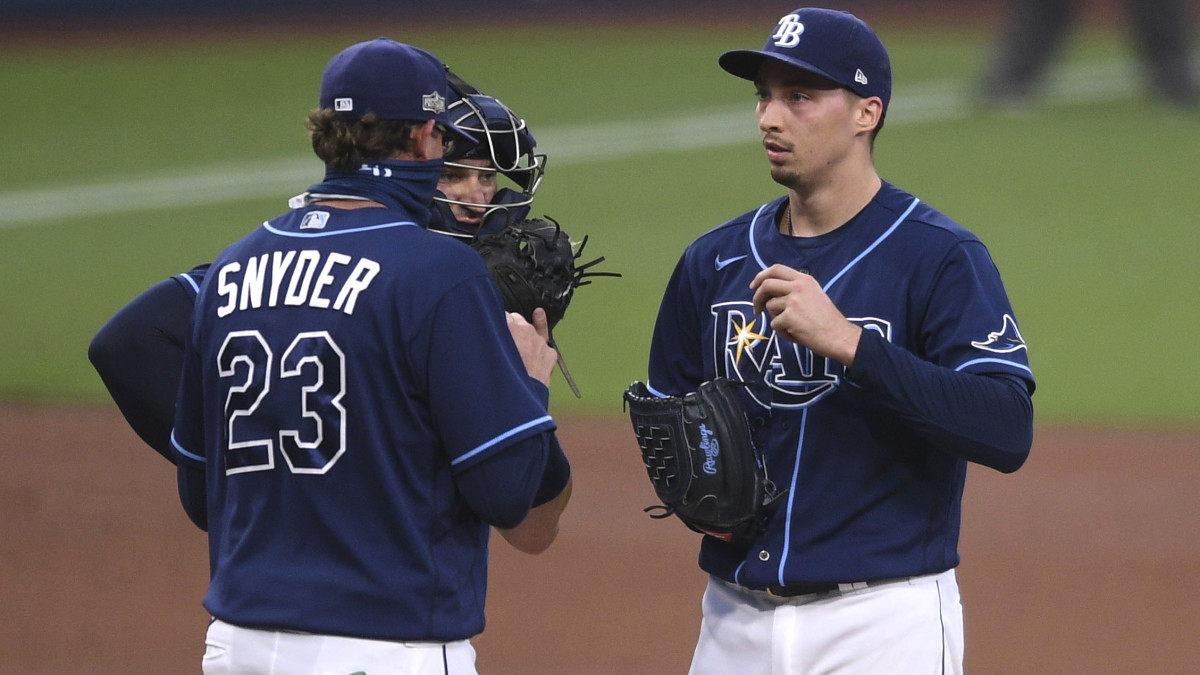Rays, Yankees Don't Turn to Bullpens at First Sign of Trouble
Baseball fans have had their pick of only-in-2020 moments this season: socially distant walk-off celebrations, balls hitting cardboard cutout fans, players shouting expletives over fake crowd noise. But Monday night may have provided the first only-in-October-2020 moment—and it provided two of them.
Twice in Game 1 of the American League Division Series between the Yankees and Rays, which New York won 9–3, a starting pitcher found himself in trouble in the middle innings, and twice he was permitted to work out of it.
Because all playoff games from this point forward are being played at neutral sites, there is no travel. And because there is no travel, there are no travel days until the World Series. This means that a five-game DS, which usually takes place over seven days, is instead compressed into five—which means starting pitchers become even more important than usual. Teams can’t go to their bullpen at the first sign of trouble without risking wearing out their relievers.

Both Tampa Bay manager Kevin Cash and New York manager Aaron Boone faced the decision of what to do with a struggling starter on Monday. The Rays’ Blake Snell fooled exactly no one through the first four frames. He had allowed only two runs, but he had also induced just two swings and misses, one on his curveball and one on his slider.
Meanwhile, the Yankees’ Gerrit Cole was having similar trouble. He had allowed three runs, and the Rays were spraying line drives around Petco Park.
Snell began the fifth inning at 67 pitches. He allowed a home run to catcher Kyle Higashioka to tie the game. One out later, Snell served up another one to right fielder Aaron Judge. Snell had thrown 75 pitches. He stayed in, got another out, then allowed a ringing double to first baseman Luke Voit before finally striking out designated hitter Giancarlo Stanton.
Cole got two quick outs to open the inning. Then he walked second baseman Brandon Lowe. On his 76th pitch of the night, Cole gave up a single to left fielder Randy Arozarena. Cole threw two pitches well out of the strike zone to first baseman Ji-Man Choi before giving in and intentionally walking him. He struck out right fielder Manuel Margot for the final out.
A year ago, both pitchers might have been headed for the showers. The Yankees and Rays boast among the most talented bullpens in the sport: The Rays led the league in almost every relevant stat this year, and the Yankees retain the core of the unit that did the same last season. In a normal year, Snell might not even have begun the fifth; he’d almost certainly have been lifted after Judge’s bomb. Cole was more of a borderline case, but he could have come out after the intentional walk.
Last year, the average starting pitcher on a playoff team threw 86.1 pitches per game in the regular season and 84.9 in the postseason. This year, the average starting pitcher on a playoff team threw 79.9 pitches per game in the regular season, so we might expect his postseason output to be somewhere in the high 70s.
Not on Monday. That fifth inning ended Snell’s night at 84 pitches. Cole made it through six and 97. The game did not become a blowout until the ninth, when Stanton socked a grand slam off righty John Curtiss. For most of the night, the managers had little margin for error.
Teams will rely on every last pitcher on their roster in these condensed series. (In some cases, those might not be the pitchers they would most want in these situations—clubs did not learn of the new playoff schedule until after the trade deadline.) They will try to steal outs. Curtiss’s night went single-walk-strikeout-single-walk-grand slam-popout-single. Cash acknowledged afterward that he had let Curtiss stay in the game as long as he did in an attempt to save the rest of the bullpen.
“A little bit,” said Cash. “Game to game, depending on what took place the night before, maybe you adjust.” He added that he had not had to call upon his three top relievers: righties Nick Anderson, Diego Castillo or Peter Fairbanks.
In October 2020, that counts as a win within the loss.
